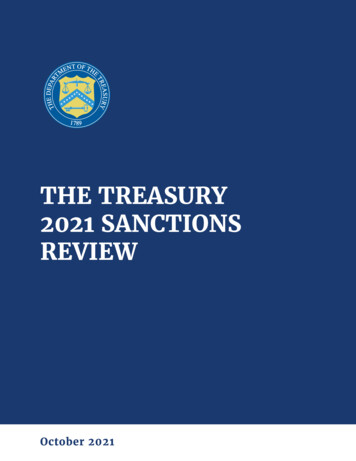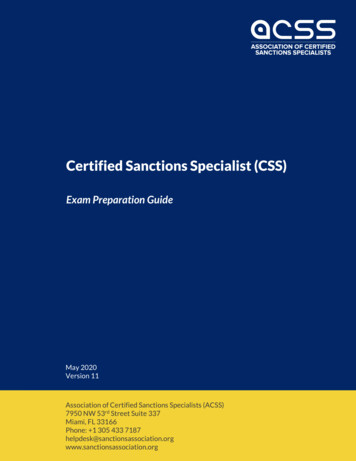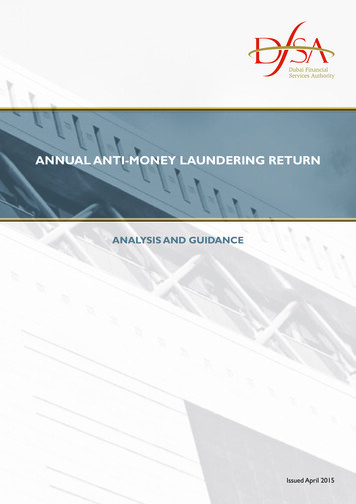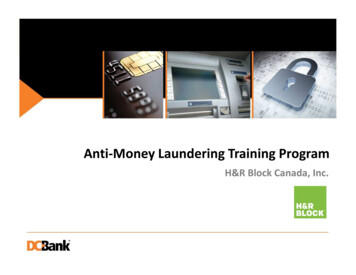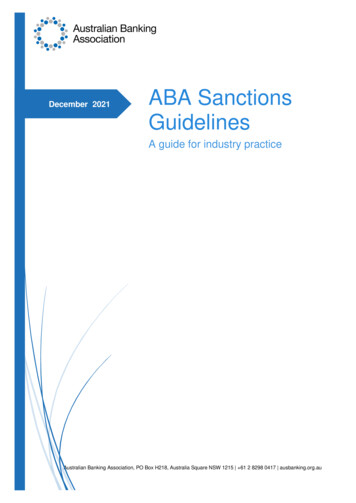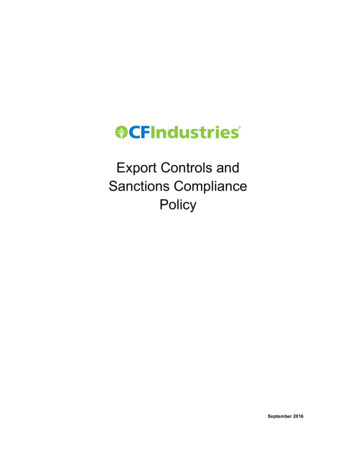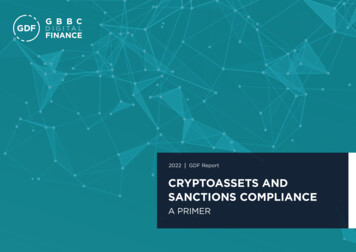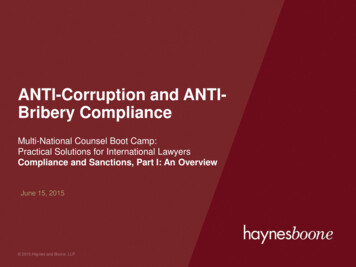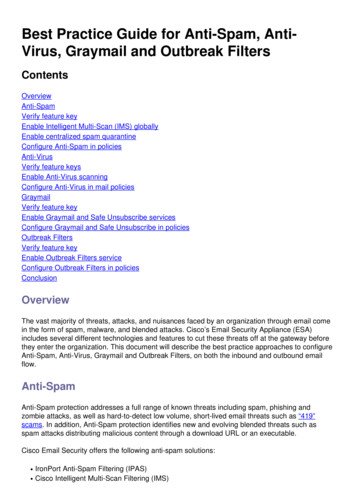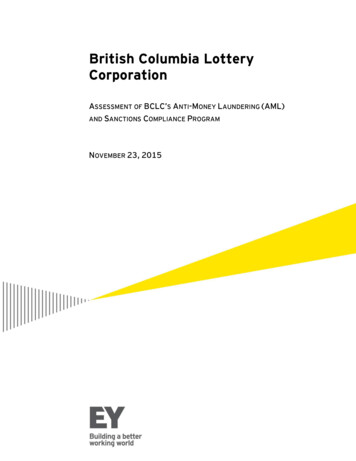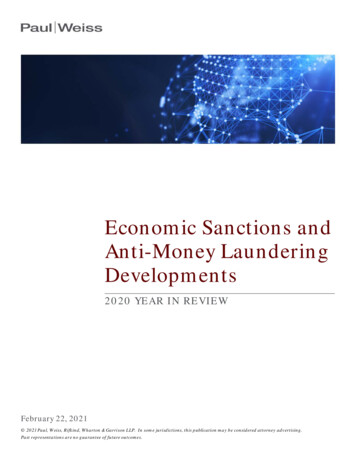
Transcription
Economic Sanctions andAnti-Money LaunderingDevelopments2020 YEAR IN REVIEWFebruary 22, 2021 2021 Paul, Weiss, Rifkind, Wharton & Garrison LLP. In some jurisdictions, this publication may be considered attorney advertising.Past representations are no guarantee of future outcomes.
Client MemorandumFebruary 22, 2021Economic Sanctions and Anti-MoneyLaundering DevelopmentsTable of ContentsExecutive Summary . 3Treasury’s Office of Foreign Assets Control. 4Changes in OFAC Sanctions Programs . 5Guidance. 10Enforcement Actions. 13Treasury’s Financial Crimes Enforcement Network. 20Guidance. 20Enforcement Actions. 22Department of Justice . 23Guidance. 23Enforcement Actions. 24Federal Banking Agencies . 25Guidance and Rulemaking . 25Enforcement Actions. 26New York Department of Financial Services. 28Enforcement Actions. 28Additional Developments . 29Virtual Currency . 29Actions Taken against Chinese Companies and Related Updates . 31Considerations for Strengthening Sanctions/AML Compliance. 36 2021 Paul, Weiss, Rifkind, Wharton & Garrison LLP. In some jurisdictions, this publication may be considered attorney advertising. Past representations are no guarantee of future outcomes.2 PAUL, WEISS, RIFKIND, WHARTON & GARRISON LLPpaulweiss.com
CLIENT MEMORANDUMFEBRUARY 22, 2021Executive SummaryThis memorandum surveys economic sanctions and anti-money laundering (“AML”) developments and trends in 2020and provides an outlook for the year ahead under the new Biden Administration. We also provide some thoughtsconcerning compliance and risk mitigation in this challenging environment.These areas saw significant activity last year with the Trump Administration continuing to make aggressive use ofsanctions authorities, although some of these efforts were paused by the courts. On the enforcement front, federal andstate agencies imposed nearly 960 million in penalties for sanctions/AML violations last year, as compared to over 2.4 billion in 2019, reflecting both a smaller number of enforcement actions and a lack of large, multi-agencyresolutions with financial institutions in 2020 as compared to 2019.President Trump’s final year in office witnessed significant and constant changes to the sanctions policy landscape asPresident Trump continued to wield sanctions as a primary foreign policy tool. Throughout 2020, the TrumpAdministration and Congress pursued aggressive new sanctions against China, including on the topics of U.S.investment in Chinese companies, human rights abuses, corruption, and data and censorship. President Trump’s use ofthe International Emergency Economic Powers Act (“IEEPA”) to ban the use of the TikTok and WeChat apps in theUnited States was preliminarily enjoined by three federal district courts, which resulted in new case law on the scope ofthe “personal communications” and “informational materials” IEEPA exceptions. The Trump Administration alsocontinued its “maximum pressure” sanctions campaign against Iran and Venezuela, issuing new executive orderstargeting entire sectors of the Iranian economy with secondary sanctions and making dozens of new sanctionsdesignations under both programs. President Trump also issued an executive order authorizing the blocking of certainpersons associated with the International Criminal Court (“ICC”) and designated two ICC officials in an aggressive andcontroversial effort to deter an ICC investigation into possible U.S. war crimes in Afghanistan; a federal court has issueda preliminary injunction against the enforcement of the executive order. All told, in 2020 Treasury’s Office of ForeignAssets Control (“OFAC”) made over 700 new designations under its various sanctions programs, issued over 40 new oramended general licenses, and announced 17 public enforcement actions. OFAC and the Department of Justice (“DOJ”)also issued landmark parallel enforcement actions in the Essentra FZE matter, putting non-U.S., non-financialcompanies on notice of the risk of criminal enforcement for conducting business with sanctioned countries whilemaking use of U.S. dollar (and other currency) transactions that flow through the U.S. financial system. Congress alsopassed legislation authorizing new sanctions against Turkey and Russia.Enforcement of the Bank Secrecy Act/anti-money laundering (“BSA/AML”) laws—or their state analogues—remained apriority for a panoply of agencies, including DOJ, Treasury’s Financial Crimes Enforcement Network (“FinCEN”), thefederal banking agencies, the Securities and Exchange Commission (“SEC”), the Commodity Futures TradingCommission (“CFTC”), the Financial Industry Regulatory Authority (“FINRA”), and the New York Department of FinancialServices (“DFS”). Individual liability for BSA/AML violations remained a theme with FinCEN’s first-ever enforcementaction against a bank compliance officer, which resulted in a 450,000 consent order. The CFTC also took its firstenforcement action to enforce BSA requirements in its 11.5 million settlement with Interactive Brokers LLC. Congressalso enacted legislation constituting the most significant revision to the BSA since the USA PATRIOT Act, whichrequired a host of private companies to report their beneficial ownership information to FinCEN.U.S. agencies also issued a flurry of guidance and advisories, effectively raising expectations for private sectorcompliance efforts. This guidance encompasses a wide range of topics, including operations during the COVID-19pandemic, human rights abuses and associated supply chain risks, sanctions risks associated with high-value artwork,North Korea’s ballistic missile procurement and cyber threats, sanctions risks for facilitating ransomware payments,3 PAUL, WEISS, RIFKIND, WHARTON & GARRISON LLPpaulweiss.com
CLIENT MEMORANDUMFEBRUARY 22, 2021sanctions compliance for the maritime industry, human trafficking and related activities, BSA requirements for hemprelated customers and non-profits, customer due diligence requirements for covered financial institutions, virtualcurrency, and updated guidance from DOJ on corporate compliance programs.This memorandum also surveys additional developments that are of importance to regulators and the private sector.First, we review guidance and enforcement actions throughout 2020 by multiple agencies focused on the unique AMLand sanctions risks associated with virtual currency transactions and businesses. Second, we survey the numeroussanctions and export control actions taken by the Trump Administration in 2020 and January 2021 targeting Chinesetechnology companies, including “bans” against various Chinese apps; the Department of Commerce’s issuance of theinformation and communications technology services (ICTS) supply chain interim final rule; multiple Entity Listdesignations; and the Department of State’s “Clean Network” Initiative.We expect the Biden Administration, like all recent administrations, to make significant use of sanctions authorities toeffectuate U.S. foreign policy and national security goals. It is expected, however, that President Biden will take a morenuanced and multi-lateral approach. While we do not expect the Biden Administration to drastically roll back sanctionsby the Trump Administration in the immediate term, it will likely reevaluate the effectiveness of several of the sanctionsactions taken by the Trump Administration. President Biden has stated that he will pursue a renewal of the JointComprehensive Plan of Action (“JCPOA”)—the Iran nuclear deal that the United States joined under President Obamaand withdrew from under President Trump. While reengagement with Iran will present both domestic and foreignpolicy challenges, President Biden’s national security advisor has noted that the United States will also engage in“follow-on negotiation” with Iran after Iran re-enters compliance with the JCPOA.1 President Biden is also expected totake a more liberal approach to Cuba and revive several of the authorizations established by President Obama andrevoked by President Trump. With respect to China, an area where certain increased sanctions have garnered strong,bi-partisan support in Congress, President Biden is likely to engage in a broad review of China policy before makingany significant changes to Trump-era sanctions. His administration, however, has already announced that it will reviewthe policy rationales for the TikTok and WeChat bans. Overall, we believe the Biden Administration is likely to agreewith the recent statement by former Treasury Secretary Jack Lew, who criticized President Trump’s overuse of sanctions,noting that sanctions’ “potency is precisely why they should be used carefully, with the goal of ensuring our toolsremain effective for a long time to come,” because overuse “harms American economic primacy” and encourages othercountries to identify alternatives to the “centrality of the U.S. economy and dollar.”2 In addition, we expectenforcement in the BSA/AML and sanctions space to continue to be a priority—and perhaps an even greater priority—under the Biden Administration.Treasury’s Office of Foreign Assets ControlAs noted above, the Trump Administration and Congress significantly ratcheted up sanctions against China throughthe conclusion of the Trump presidency. Additionally, last year saw important changes to other sanctions programsadministered by OFAC, particularly the Iran, Venezuela, and Cuba sanctions programs. The Trump Administration alsoimposed new sanctions programs targeting Mali and the International Criminal Court. The U.S. Government alsocompleted the removal of Sudan from the State Sponsors of Terrorism List, an action which will result in the removal ofthe residual export and investment restrictions that had survived the 2017 revocation of sanctions against Sudan. 3OFAC published seventeen public enforcement actions in 2020 imposing over 23.5 million in penalties, and twoadditional settlements imposing over 9.5 million in penalties in the final weeks of the Trump Administration. Althoughthere was no high-value, multi-agency enforcement action against a financial institution in 2020 (and therefore asignificant drop from the total OFAC penalties imposed in 2019), the number of OFAC settlements reached in 2020 was4 PAUL, WEISS, RIFKIND, WHARTON & GARRISON LLPpaulweiss.com
CLIENT MEMORANDUMFEBRUARY 22, 2021in-line with the average over the preceding five years. OFAC continued to pursue public enforcement actions againstcompanies in a broad variety of industries, including financial, shipping, technology, and travel. OFAC also continued topursue enforcement actions against both U.S. and non-U.S. companies, and to use its public notices regarding itsenforcement activity to highlight the sanctions compliance deficiencies or breakdowns responsible for the violations.Additionally, parallel resolutions by OFAC and DOJ, and a subsequent OFAC settlement, made clear that a non-U.S.,non-financial company’s receipt of payments that flowed through the U.S. financial system (in those cases, the non-U.S.branch of a U.S. bank) can result in civil and even criminal sanctions liability by causing U.S. financial institutions toviolate sanctions.OFAC Director Andrea Gacki has been chosen by the Biden Administration to serve as Acting Treasury Under Secretaryfor Terrorism and Financial Intelligence. OFAC Deputy Director Bradley Smith will be serving as Acting OFAC Director. Inher Senate confirmation hearing, Treasury Secretary Janet Yellen stated that, once onboard, she would ask DeputyTreasury nominee Secretary Wally Adeyamo to conduct a review of U.S. sanctions policy to ensure that sanctions areused “strategically and appropriately.”4Changes in OFAC Sanctions ProgramsChina. The Trump Administration imposed aggressive new sanctions against China in 2020, including two newsanctions programs. President Trump issued the Communist Chinese Military Company (“CCMC”) sanctions in responseto his finding of a national security threat posed by U.S. person investment in certain Chinese securities, which hebelieves helps finance the development and modernization of the Chinese military. Additionally, President Trump alsoissued Hong Kong-related Sanctions (“HKRS”) in response to China’s human rights abuses in Hong Kong. Each of thesenew sanctions programs is described in additional detail below. In June 2020, President Trump also signed thebipartisan Uyghur Human Rights Policy Act, 5 which condemns actions taken by the Chinese government with respectto Muslim minority groups in the Xinjiang Uyghur Autonomous Region. Shortly thereafter, the Departments of State,Treasury, Commerce, and Homeland Security issued a detailed guidance document highlighting risks to doing businessconnected with the forced labor practices in Xinjiang and China generally (additional detail on this advisory is providedbelow). OFAC also designated a number of Chinese individuals and entities under various existing sanctions programs,including its Global Magnitsky sanctions—including the Xinjian Public Security Bureau, the Xinjiang Production andConstruction Corps (“XPCC”), a paramilitary group associated with the Chinese Communist Party (“CCP”), XPCC’s formerPolitical Commissar and Deputy Party Secretary and Commander, and other current and former senior officials of theCCP—as well as Iran sanctions, Venezuela sanctions, and counter-terrorism sanctions.Together with the escalating trade war between the United States and China and the Department of Commerce’sratcheting up of export controls described at the end of this memorandum, these new sanctions signal the TrumpAdministration’s forceful approach to China.CCMC Sanctions. As discussed in our prior memoranda, on November 12, 2020, President Trump issued an ExecutiveOrder titled “Addressing the Threat from Securities Investments that Finance Communist Chinese Military Companies,”which went into effect on January 11, 2021 (after a 60-day grace period) and was amended by President Trump onJanuary 13, 2021 (as amended, the “CCMC Order”). 6 In the CCMC Order, President Trump cited the national securitythreat posed by the People’s Republic of China’s (the “PRC”) national strategy of Military-Civil Fusion, and, specifically,the threat posed by PRC companies that sell securities to U.S. investors and then invest this capital to finance thedevelopment and modernization of the Chinese military. The CCMC Order furthers efforts by the Trump Administrationto reduce Chinese companies’ access to the U.S. economy—here, the access of listed CCMCs to U.S. capital marketsand U.S. investors.5 PAUL, WEISS, RIFKIND, WHARTON & GARRISON LLPpaulweiss.com
CLIENT MEMORANDUMFEBRUARY 22, 2021The CCMC Order prohibits U.S. persons7 from engaging in transactions (defined to mean “the purchase for value, orsale”) in publicly traded securities or any securities8 that are derivative or otherwise designed to provide investmentexposure to such publicly traded securities of any identified “Communist Chinese Military Companies” (“CCMCs”). Sofar the Department of Defense (“DoD”) has identified 44 entities as CCMCs: 31 in an Annex to the November 12, 2020order, four on December 3, 2020, and nine on January 14, 2021.9 With respect to the CCMCs identified in the Annex,the CCMC Order provided a 60-day grace period which ended on January 11, 2021, and U.S. persons will have untilNovember 11, 2021 to divest from any publicly traded securities of such CCMCs held at the end of the grace period(i.e., held as of January 11, 2021). With respect to any entity identified and listed as a CCMC after November 12, 2020,the CCMC Order prohibits U.S. persons from transacting in that newly listed entity’s publicly traded securities after 60days from the date of the entity’s listing as a CCMC. Additionally, U.S. persons in possession of such newly listedsecurities will have 365 days from the date of that entity’s listing to divest the securities of the CCMC that they hold.As discussed in our prior memoranda, 10 thus far OFAC has issued thirteen FAQs and two general licenses pertaining tothese sanctions. Investment firms and other companies continue to struggle with the impact of these sanctions and theremaining uncertainty regarding their application.The National Defense Authorization Act for Fiscal Year 2021 (“2021 NDAA”), which was enacted over President Trump’sveto on January 1, 2021, expands the definition of CCMC to include any entity that is: (i)(a) directly or indirectly owned,controlled, or beneficially owned by, or in an official or unofficial capacity acting as an agent of or on behalf of, thePeople’s Liberation Army or any other organization subordinate to the Central Military Commission of the ChineseCommunist Party; or (b) identified as a “Military-Civil Fusion Contributor” to the Chinese defense industrial base; and(ii) engaged in providing commercial services, manufacturing, producing, or exporting. The concept of “Military-CivilFusion Contributor” reflects a significant expansion and is defined broadly and encompasses several sub-categories. 11The 2021 NDAA also requires the DoD CCMC List to be updated by April 15, 2021 and annually thereafter untilDecember 21, 2030.12Hong Kong Autonomy Act and EO 13936. On July 14, 2020, President Trump signed the bipartisan Hong KongAutonomy Act (the “HKAA”) into law and issued Executive Order 13936 (the “HK Order”) implementing the law. As wehighlighted in a prior memorandum, 13 the HKAA and the HK Order authorize the sanctioning of non-U.S. persons thatare found to be involved in the undermining of Hong Kong’s autonomy as well as sanctioning of foreign financialinstitutions (“FFIs”) that engage in certain transactions with such identified non-U.S. persons.14 Under the HKAA, theDepartment of State must submit a report (the “State Report”) identifying non-U.S. persons determined to “materiallycontribute” to the failure of the PRC government to meet its obligations under the Sino-British Joint Declaration (the“Joint Declaration”) or Hong Kong’s Basic Law. Additionally, the HKAA requires the Treasury Department to submit areport (the “Treasury Report”) to Congress identifying any FFI that knowingly conducts a “significant transaction” with anon-U.S. person identified in the State Report. Additionally, the HK Order revoked Hong Kong’s special trading status,consistent with Secretary of State Michael Pompeo’s May 2020 report to Congress that Hong Kong no longer warrantspreferential treatment under U.S. law as it no longer maintains a “high degree of autonomy” from mainland China.As required under the HKAA, the Department of State submitted its State Report on October 14, 2020.15 The StateReport listed ten prominent PRC and Hong Kong officials that were previously designated by OFAC under the HKOrder. On December 7, 2020, OFAC designated the 14 Vice-Chairpersons of the 13th National People’s CongressStanding Committee (“NPCSC”) as Specially Designated Nationals (“SDNs”).16 The State Department press releasenoted that the NPCSC had “effectively neutered the ability of the people of Hong Kong to choose their electedrepresentatives,” demonstrating “once again Beijing’s complete disregard for its international commitments under theSino-British Joint Declaration, a U.N.-registered treaty.”17 However, these 14 individuals were not identified by the6 PAUL, WEISS, RIFKIND, WHARTON & GARRISON LLPpaulweiss.com
CLIENT MEMORANDUMFEBRUARY 22, 2021State Department in the October 14, 2020 State Report. As a result, dealings with these individuals did not triggerinclusion on the subsequent Treasury Report identifying FFIs that knowingly conduct a significant transaction with nonU.S. persons listed in the State Report. In fact, the Treasury Report was submitted on December 11, 2020 and did notidentify any FFI that met this criteria.18 However, the State and Treasury Departments are required to update theirreports in an “ongoing manner,” so the December 11, 2020 Treasury Report does not preclude Treasury fromidentifying FFIs that meet the HKAA designation criteria in future reports.On January 15, 2021, OFAC published the Hong Kong-Related Sanctions Regulations in order to implement the HKOrder.Iran. The Trump Administration continued to increase sanctions pressure against Iran in 2020. In January, PresidentTrump issued E.O. 13902, which authorizes blocking sanctions on persons operating in “the construction, mining,manufacturing, and textile sectors of the Iranian economy, or any other sector of the Iranian economy as may bedetermined by the Secretary of the Treasury, in consultation with the Secretary of State.” The executive order providesfor secondary sanctions targeting financial institutions that facilitate significant financial transactions in connectionwith these sectors or on behalf of any person whose property and interest in property are blocked pursuant to theorder. E.O. 13902 authorizes blocking sanctions on non-U.S. persons who knowingly engage in significant transactionsfor the sale or supply of goods or services used in connection with one of the specified sectors of the Iranian economy.Similarly, secondary sanctions are also authorized for those who are found to materially assist or provide support forthose persons directly targeted by the order as well as for those who are found to provide support for goods andservices used in connection of these sectors or entities who are owned or controlled by any person whose propertyand interests in property are blocked pursuant to E.O. 13902. The order does not apply to those persons engaged inhumanitarian transactions with Iran, in line with existing authorizations in the Iran program. On October 8, 2020, theTreasury Department identified the financial sector of the Iranian economy under E.O. 13902 and OFAC sanctioned 18Iranian financial institutions pursuant to the executive order. 19 Concurrent with this action, OFAC issued a generallicense pursuant to E.O. 13902, authorizing transactions and activities involving Iranian financial institutions sanctionedunder E.O. 13902 that are authorized, exempt, or otherwise not prohibited under its Iran Transactions and SanctionsRegulations. 20The Trump Administration also continued to take significant actions against Iran’s defense sector and nuclear regime inconnection with its 2018 withdrawal from the Joint Comprehensive Plan of Action (“JCPOA”). On July 27, 2020,following a 60-day wind-down period, the Department of State ended the sanctions waivers that previously allowednon-U.S. persons to engage in certain activities involving certain JCPOA originating nuclear projects in Iran.21 InSeptember, following the failure of the United States to reinstate United Nations sanctions on Iran in relation to Iran’sfailure to meet its commitments under the JCPOA, President Trump issued E.O. 13949, “Blocking Property of CertainPersons with Respect to the Conventional Arms Activities of Iran,” imposing secondary sanctions against non-U.S.persons determined to engage in the transfer and sale of certain conventional arms shipments and the supply ofrelated services to Iran. OFAC designated several individuals and entities pursuant to E.O. 13949 and the U.S.Commerce Department also added several individuals to its Entity List for playing a “critical role in Iran’s nuclearweapons development program.” 22Even as the United States has continuously increased sanctions pressure on Iran, it has taken steps to facilitatehumanitarian trade to benefit the Iranian people. For example, OFAC issued a new General License 8 authorizingcertain humanitarian transactions involving the Central Bank of Iran and sales to Iran of food, agricultural devices,medicine, and medical devices. Amended General License 8A extends this authorization to certain transactionsinvolving the National Iranian Oil Company. 237 PAUL, WEISS, RIFKIND, WHARTON & GARRISON LLPpaulweiss.com
CLIENT MEMORANDUMFEBRUARY 22, 2021Venezuela. Two years after the United States’ recognition of Maduro opposition leader and Venezuelan NationalAssembly President Juan Guaidó as the Interim President of Venezuela, Maduro remained in control in Venezuela, andthe Trump Administration continued its “maximum pressure” sanctions campaign against the Maduro regime.The United States imposed a series of high profile Venezuela designations in 2020 targeting the sale of Venezuelan oil.First, in February and March, OFAC designated two subsidiaries of Rosneft, Russia’s largest oil company, for brokeringthe sale and transport of Venezuelan crude oil.24 Less than three weeks after the second designation, Rosneftannounced the termination of its operations in Venezuela and the disposal of its Venezuela-related assets. 25 In June,OFAC designated a number of shipping companies and related vessels for loading, transporting, or otherwise holdingVenezuelan crude oil or operating in the Venezuelan oil sector. OFAC subsequently delisted certain shippingcompanies and vessels after they “committed to enhanced risk-based sanctions compliance programs . . . and pledgedto cease involvement in the oil sector of the Venezuelan economy so long as the Maduro regime remains in power.”26Additionally, OFAC narrowed the scope of General License 8, which previously authorized five named U.S. oil sectorcompanies to “engage in all transactions and activities ordinarily incident and necessary to operations in Venezuelainvolving [SDN] PdVSA,” to subsequently authorize only “transactions and activities ordinarily incident and necessary tothe limited maintenance of essential operations [and agreements]” for “the safety of personnel, or the integrity ofoperations and assets in Venezuela,” and participation in shareholder and board meetings. 27The United States also imposed sanctions against several Maduro-supporting members of the Venezuelan NationalAssembly and others determined to be involved in Venezuelan election interference or corrupt efforts to enrichMaduro and his family.28 Further, in November, OFAC designated CEIEC, a Chinese technology company with over 200subsidiaries and offices worldwide, for materially supporting the Maduro regime’s malicious cyber efforts, includingblocking Venezuelan citizens from accessing certain online news and social media sites, causing information blackoutsthrough internet and cell service disruptions, and phishing of Venezuelan citizens’ personal information. 29 Additionally,following Venezuela’s December 6, 2020 elections, OFAC designated Ex-Cle Soluciones Biometricas C.A. (“Ex-CleC.A.”), a Venezuelan subsidiary of an Argenti
This memorandum surveys economic sanctions and anti-money laundering ("AML") developments and trends in 2020 and provides an outlook for the year ahead under the new Biden Administration. We also provide some thoughts concerning compliance and risk mitigation in this challenging environment.
